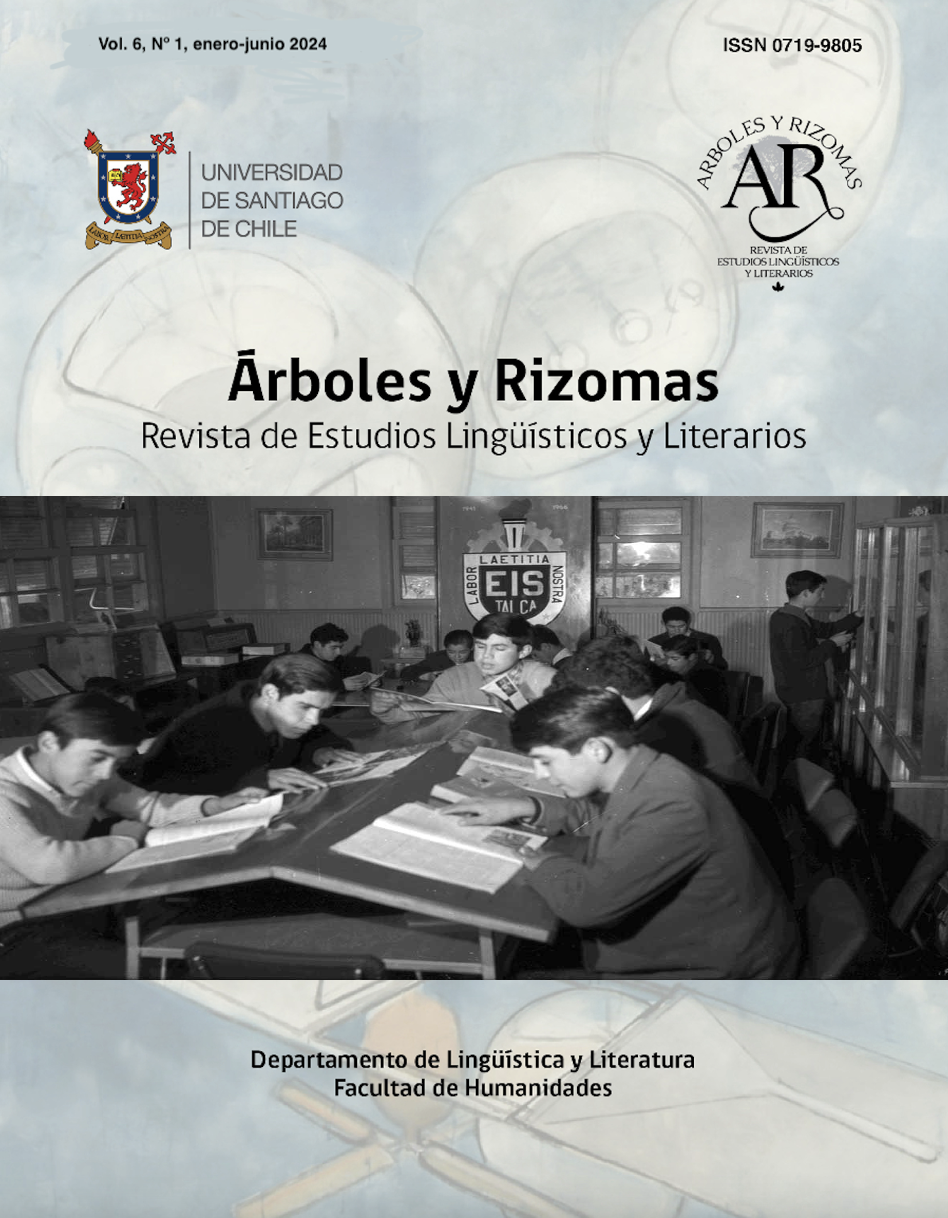The creepy- spectral in the novel Chilco by Daniela Catrileo
DOI:
https://doi.org/10.35588/ayr.v6i1.6711Keywords:
champurria, mestizo, creepy, spectral, contemporary fantastic narrativeAbstract
This paper approaches the novel Chilco (2023) by the Chilean writer Daniela Catrileo from the creepy-spectral and considers this register within the categories of fantastic narratives through which a critical reading of colonialism and coloniality is made. For this purpose, the analysis has been structured in two parts; the first, named the creepy, gives an account of the mechanisms of colonial and neocolonial power that, in the context of the novel, threaten the survival of human groups and species with their voracious tentacles. A second part refers to the spectral nomadic wanderings - the champurria, quiltro and/or mestizo – that becomes a herd or any other form of inter-species solidarity link. According to the above, it is concluded and projected in this analysis that the creepy-spectral opens possibilities to approach other literary corpora from the contemporary fantastic as a writing and political search by Latin American authors of new forms to represent reality.
Downloads
References
Abrams, J. & Zweig, C. (2020). Encuentro con la sombra. Kairós.
Alemany Bay, C. (2019). La construcción de una nueva identidad genérica y fronteriza: La narrativa de lo inusual. En C. Luna & R. Hernández (Eds.), Más allá de la frontera: Migraciones en las literaturas y culturas hispano-americanas (pp. 23-36). Peter Lang.
Braidotti, R. (2013). Lo Posthumano (J. C. Gentile, Trad.).Gedisa.
Catrileo, D. (2014) Río Herido. Libros del Perro Negro.
Catrileo, D. (2017). Invertebrada. Luma Foundation.
Catrileo, D. (2017). El territorio del Viaje. Archipiélago Ediciones.
Catrileo, D. (2018). Guerra Florida/Rayülen Malon. Del Aire Editores.
Catrileo, D. (2019). El nacimiento del río o poética del río: Iñche Daniela Catrileo Pingen. Heteroptopías, 2(4), 161-167. https://revistas.unc.edu.ar/index.php/heterotopias/article/view/27287/28938
Catrileo, D. (2022). Piñen. Las afueras.
Catrileo, D. (2023). Chilco. Planeta Chilena.
Derrida, J. (1968). La diferencia/ [differánce]. Escuela de Filosofía Universidad ARCIS.https://www.philosophia.cl/biblioteca/Derrida/La%20Diferencia.pdf
Derrida, J. (2023) Espectros de Marx (J.M. Alarcón y C. de Peretti, Trad.). Trotta.
Espinosa, Y. (2022). De por qué es necesario un femenismo descolonial. Icaria.
Fisher, M. (2016). Realismo capitalista (C. Iglesias, Trad.). Caja Negra Editora.
Fisher, M. (2018). Lo raro y Lo Espeluznante (N. Molines, Trad.). Alpha Decay.
García-Valero, B. (2020). Los trazos en el cuerpo, el cuerpo a trazos. Imaginario, lirismo y alteridad interior en la narrativa de lo inusual escrita por mujeres. Brumal. Revista de investigación sobre lo Fantástico, 8(1), 17-34. https://revistes.uab.cat/brumal/article/view/v8-n1-garcia-valero/pdf-es-39
Haesbaert, R. (2007). Território e multiterritorialidade:um debate. Geographia, 9(17),19-46.
Haraway, D. (2019). Seguir con el problema generar parentesco en el Chthuluceno (H. Torres, Trad.). Edición Consonni.
Insunza, A. (2010). Pachacuti [Memoria para optar al título de Artista Pintor]. Universidad de Chile.https://repositorio.uchile.cl/handle/2250/101502
Jameson, F. (1991). Teoría de la postmodernidad (C. Montolío & R. del Castillo, Trad.). Epulibre. https://www.academia.edu/89148304/Fredric_Jameson_Teoria_de_la_postmodernidad
Lugones, M. (2008). Colonialidad y Género. Tabula Rasa,(9),73-101.https://www.revistatabularasa.org/numero-9/05lugones.pdf
Lugones, M. (2014). Colonialidad y género: hacia un feminismo decolonial. En W. Mignolo (Comp.), Género y descolonialidad (pp. 13-42). Del Signo.
Montecino, S. (1984). Mujeres de la tierra. CEM. https://libros.uchile.cl/407
Mora Curriao, M. (2013). Poesía mapuche: la instalación de una mismidad étnica en la literatura chilena. A contracorriente, (3), 21-53.
Moraga-García, F. (2011). La emergencia de un corpus poético de mujeres mapuche. En M. Mora Curriao, J. Caniguán & F. Moraga-García. Kümedungun/ Kümewirin. Antología poética de mujeres mapuche (siglos XX – XXI) (pp. 221-229). LOM.
Moreno, F. (2008). La ficción prospectiva: Propuesta para una delimitación del género de la ciencia ficción. En T. López & F. Moreno (Eds), Ensayos sobre ciencia ficción y literatura fantástica (pp.65-93). Asociación Cultural Xatafi.
Navarrete, C. & Saldías, G. (2018). Territorio y pertenencia: Las experiencias del desplazamiento en la poesía de mujeres mapuche. Revista de letras, 58(2), 29-42.https://periodicos.fclar.unesp.br/letras/article/view/12850/8416
Quijano, A. (2014). Colonialidad del poder, eurocentrismo y América Latina. Cuestiones y Horizontes: de la dependencia histórico-estructural a la colonialidad/descolonialidad del poder. CLACSO.
Rivera Cusicanqui, S. (2020). Ch,ixinakak Utxiwa. Una reflexión sobre prácticas y discursos descolonizadores. Tresquince.
Roas, D. (2016). Tras los límites de lo real. Páginas de Espuma.
Segarra, M. (2020). Humanimalidades. Galaxia Gutenberg.
Downloads
Submitted
2024-05-27Published
Issue
Section
License
Copyright (c) 2024 Paola Lizana

This work is licensed under a Creative Commons Attribution 4.0 International License.






